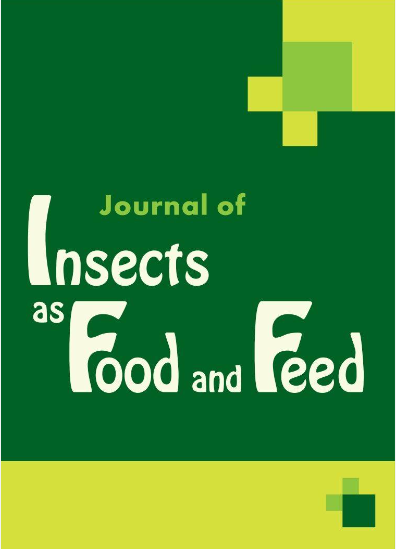Attitudes to consumption of edible insects by indigenous Māori in Aotearoa New Zealand: future commercial opportunities
IF 3.5
3区 农林科学
Q1 ENTOMOLOGY
引用次数: 0
Abstract
Entomophagy (eating insects) can be a sustainable and efficient source of protein, prevalent in many cultures worldwide. However, there is limited research on the perceptions of entomophagy in Aotearoa New Zealand, particularly indigenous Māori perceptions. This work explores Māori perspectives on entomophagy, gaining understanding of the history of entomophagy in Māori culture, how entomophagy is currently perceived, and the potential of edible insect-derived products amongst Māori. An online survey was conducted via Qualtrics™ in 2021 recruiting via close contacts and social media platforms. Within the sample (n = 172), 42% of participants indicated insects play a significant role in Māori culture as food, and 10% as rongoā (traditional Māori medicine). Additionally, insects were described as part of cultural narratives. For insects as food, 47% of participants have eaten or know of their whānau (family) eating insects, with the huhu grub (larvae of a large wood-eating beetle) being the most consumed. We also found that 87% of participants were willing to consume insects in some form. Age had little effect on the likelihood of participants eating insects, except for those aged over 55 who were less likely to consume them. Participants with a flexitarian diet were significantly more willing to consume insects than those with a meat-eating or pescatarian diet. Conversely, participants with a vegetarian diet were more likely to say they would not eat insects. Participants were significantly more likely to consume insects if they were native to Aotearoa New Zealand or fed rongoā rākau (medicinal plants) and farmed sustainably, or if they knew that the type of insect was once eaten by Māori. Our findings show that indigenous Māori already recognise insects as being culturally significant and are relatively open to consuming insects. This presents an opportunity for Māori-led businesses or collaborations with Māori to revitalise insects as a food source.新西兰奥特亚罗瓦土著毛利人对食用昆虫的消费态度:未来的商业机会
昆虫膳食(吃昆虫)是一种可持续和有效的蛋白质来源,在全世界许多文化中都很盛行。然而,有关新西兰奥特亚罗瓦地区对昆虫嗜食的看法,特别是土著毛利人的看法的研究十分有限。这项研究探讨了毛利人对昆虫嗜食的看法,了解了毛利文化中昆虫嗜食的历史、目前对昆虫嗜食的看法以及毛利人食用昆虫衍生产品的潜力。2021 年,我们通过 Qualtrics™ 进行了一次在线调查,并通过密切联系和社交媒体平台进行了招募。在样本(n = 172)中,42%的参与者表示昆虫作为食物在毛利文化中发挥着重要作用,10%的参与者表示昆虫作为rongoā(毛利传统医药)发挥着重要作用。此外,昆虫也被描述为文化叙事的一部分。在将昆虫作为食物方面,47%的参与者吃过或知道他们的家族(whānau)吃过昆虫,其中吃得最多的是胡胡蛴螬(一种大型食木甲虫的幼虫)。我们还发现,87%的参与者愿意以某种形式食用昆虫。年龄对参与者食用昆虫的可能性几乎没有影响,只有 55 岁以上的人食用昆虫的可能性较低。采用灵活饮食习惯的参与者食用昆虫的意愿明显高于采用肉食或鱼食饮食习惯的参与者。相反,素食主义者更倾向于不吃昆虫。如果昆虫原产于新西兰奥特亚罗瓦,或以rongoā rākau(药用植物)为食并以可持续方式养殖,或者知道毛利人曾经食用过这种昆虫,那么参与者食用昆虫的可能性就会大大增加。我们的研究结果表明,原住毛利人已经认识到昆虫具有重要的文化意义,并且对食用昆虫持相对开放的态度。这为毛利人主导的企业或与毛利人的合作提供了机会,以振兴昆虫这一食物来源。
本文章由计算机程序翻译,如有差异,请以英文原文为准。
求助全文
约1分钟内获得全文
求助全文
来源期刊

Journal of Insects as Food and Feed
Agricultural and Biological Sciences-Insect Science
CiteScore
7.00
自引率
17.60%
发文量
133
期刊介绍:
The Journal of Insects as Food and Feed covers edible insects from harvesting in the wild through to industrial scale production. It publishes contributions to understanding the ecology and biology of edible insects and the factors that determine their abundance, the importance of food insects in people’s livelihoods, the value of ethno-entomological knowledge, and the role of technology transfer to assist people to utilise traditional knowledge to improve the value of insect foods in their lives. The journal aims to cover the whole chain of insect collecting or rearing to marketing edible insect products, including the development of sustainable technology, such as automation processes at affordable costs, detection, identification and mitigating of microbial contaminants, development of protocols for quality control, processing methodologies and how they affect digestibility and nutritional composition of insects, and the potential of insects to transform low value organic wastes into high protein products. At the end of the edible insect food or feed chain, marketing issues, consumer acceptance, regulation and legislation pose new research challenges. Food safety and legislation are intimately related. Consumer attitude is strongly dependent on the perceived safety. Microbial safety, toxicity due to chemical contaminants, and allergies are important issues in safety of insects as food and feed. Innovative contributions that address the multitude of aspects relevant for the utilisation of insects in increasing food and feed quality, safety and security are welcomed.
 求助内容:
求助内容: 应助结果提醒方式:
应助结果提醒方式:


